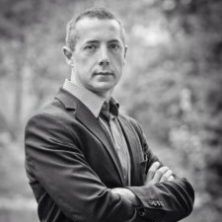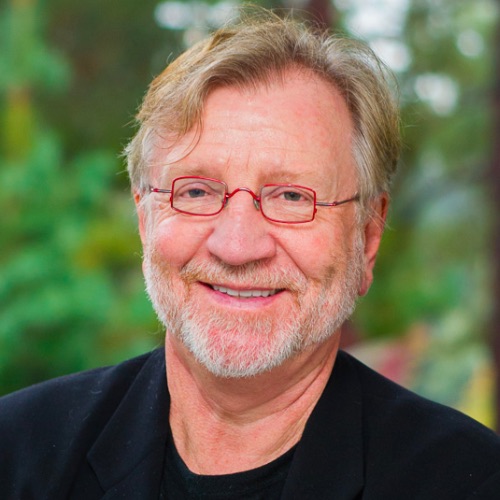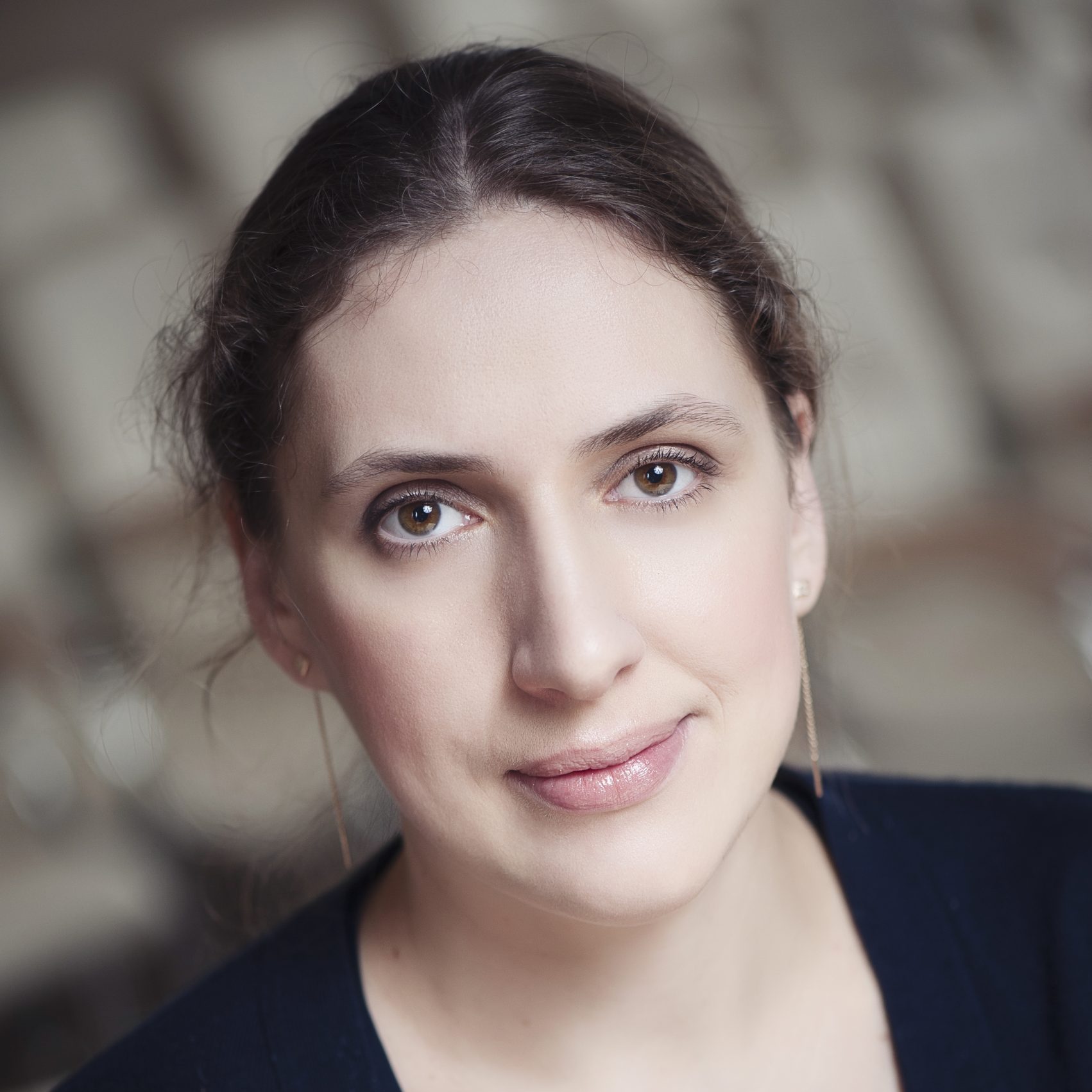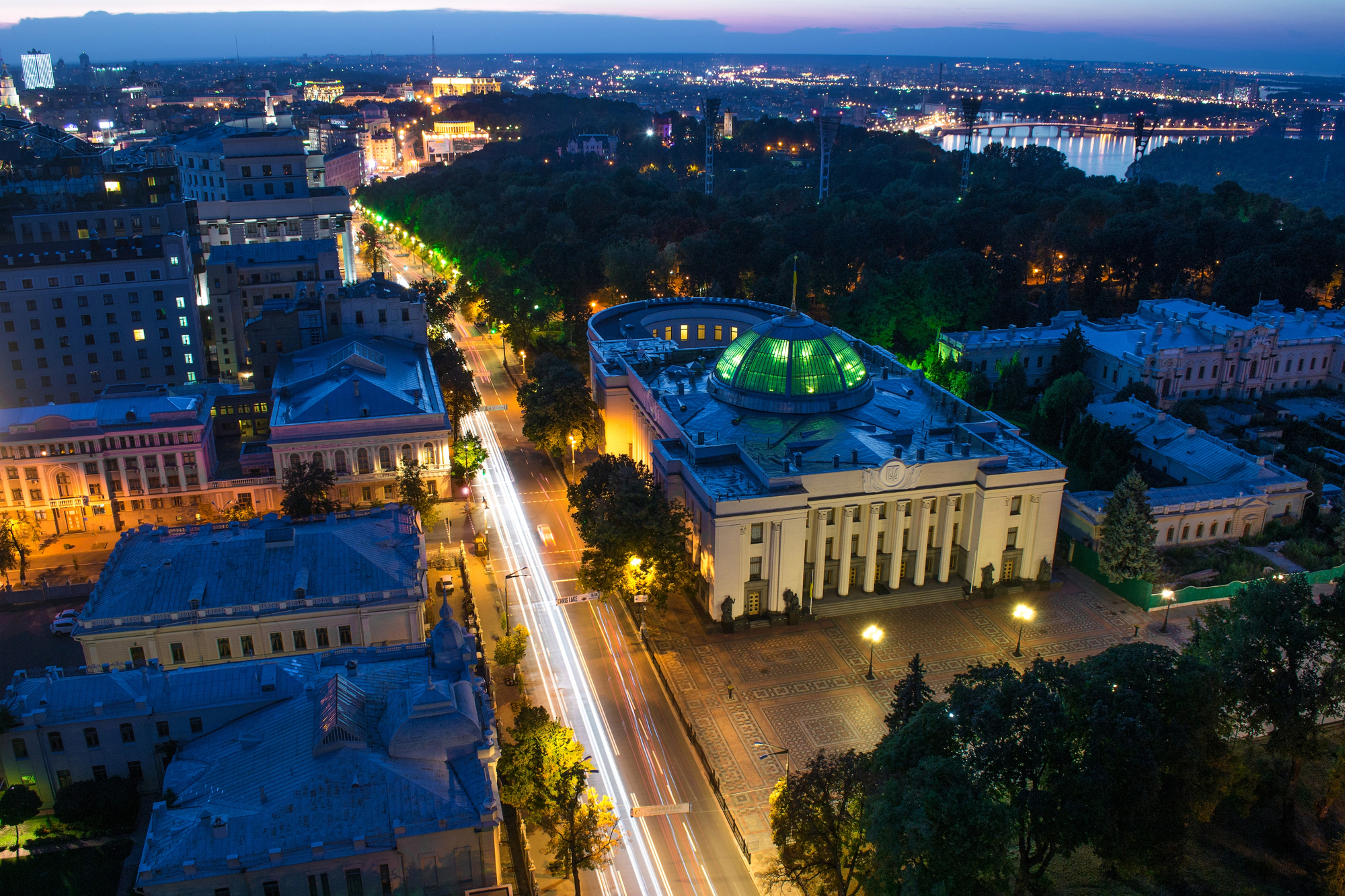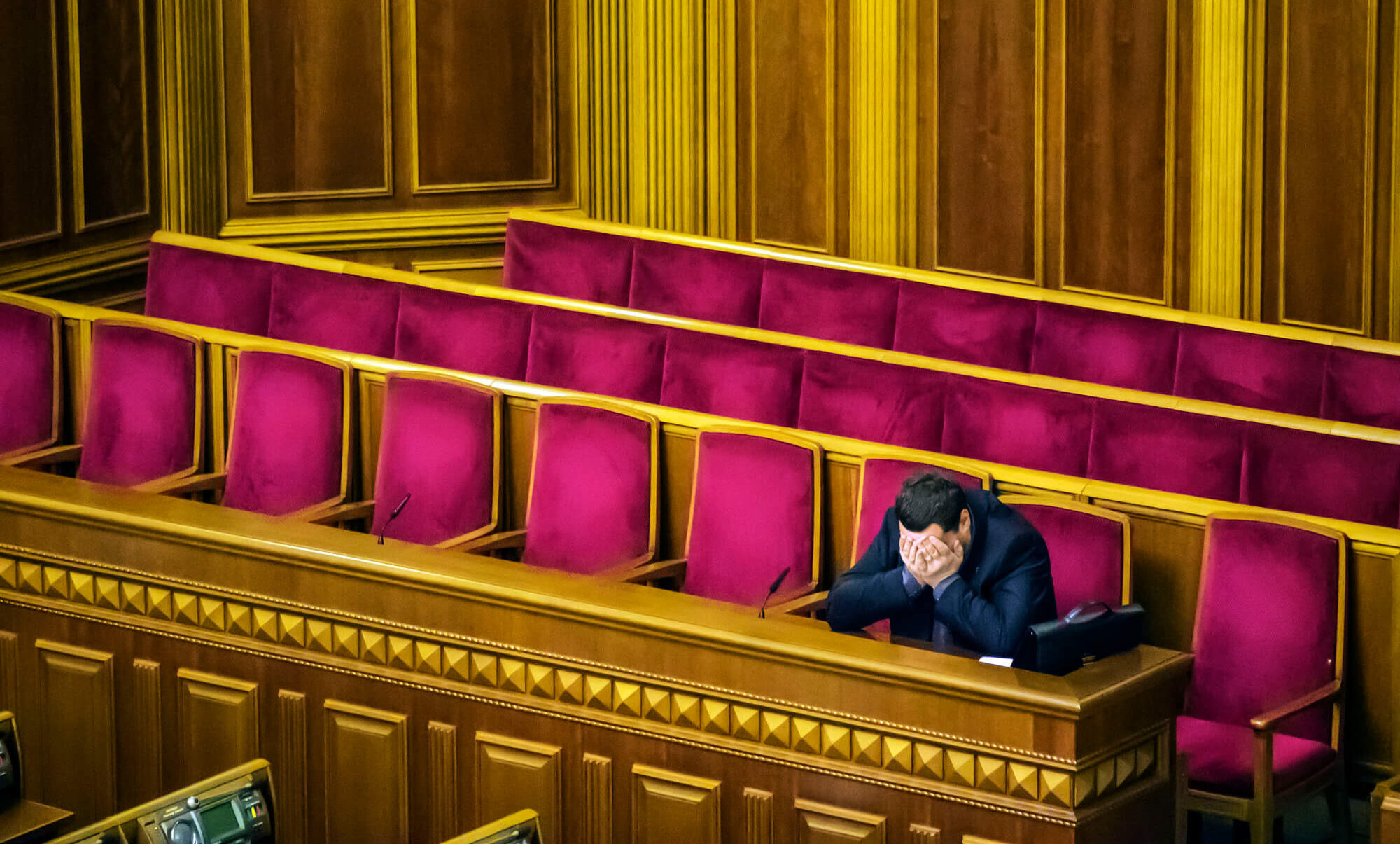VoxUkraine asked international and Ukrainian experts to comment on the answers of the President Petro Poroshenko at his latest major press conference (video). The analysis showed that the head of the state is really good at economics, debates competently on the fight for Crimea and the East of Ukraine, but when it comes to anti-corruption reforms and deoligarchization, the President becomes confused: he gets lost and doesn’t mind to shift responsibility on someone else.
The 1,5-hour long press conference by Petro Poroshenko began with a set speech: almost without looking into his lecture notes, the President briefed two hundreds journalists that gathered in the Mystetsky Arsenal on the victories of Ukraine within the last year. During the Q&A session, 17 questions were raised. VoxUkraine analyzed this part of the President’s speech, for which — in comparison to the text written in advance by speechwriters — he was definitely less prepared. By their subject matter the questions can be divided into three major groups:
- Deoligarchization and fight against corruption.
- The problems of Crimea and Donbas, relations with Russia.
- Economy and reforms.
The speech of the President was evaluated according to three criteria:
- Responsibility. Does Poroshenko assume responsibility for what is going on in certain spheres of the country’s life, or does he shift that responsibility onto others? Could his answer to the question be considered the answer of the head of the state, or is it a commentary of an outside observer?
- Directness of the answer. Did the President answer the journalists’ questions directly, or did he hide the answers behind general slogans, statement of his position, or just gave evasive replies?
These criteria show to which extent the President’s answers were meaningful and specific, and whether he assumed responsibility for a certain problem before the nation.
- Truth/half-truth/lie. Is Poroshenko truthful, and if yes — to which extent? Does he tell all the truth, or does he hide some facts, concentrating on what is beneficial to him?
VoxUkraine asked major Ukrainian and international experts in politics, economics, and international relations to comment on the President’s answers.
Corruption is a painful subject for the President
There were seven questions about corruption and the fight against oligarchs (including the President’s oligarchic past) — that is, more than on the relations with Russia or the economy. It means that this is really a hot-button issue in the society. The President’s answers contained the following statements:
It is important to remove oligarchs from state funds, government, and politics. And much has been already done: the work of Ukrnafta and the coal industry has been established, a competitive system of appointing state managers has been introduced, and in 2016, there will be independent directors. Today, removal of oligarchs from the corruption schemes is due to establishment of independent anti-corruption bodies.
There’s no point in endlessly changing general prosecutors, with whom Ukrainian people are always unhappy (this refers to Viktor Shokin — VoxUkraine); moreover, functions of the General Prosecutor’s Office have been significantly reduced and transferred to other independent bodies, so prosecutors will only represent the prosecution in court.
It doesn’t matter who is involved in corruption (the question was about Ihor Kononenko — VoxUkraine), the President supports anti-corruption investigations and the removal of parliamentary immunity; he has already submitted a corresponding bill to Verkhovna Rada. Now the matter depends on the members of parliament. Poroshenko won’t let anyone use the President’s name to make dishonest money. Concerning those close to him, the response will be very tough.
Roshen was transferred to a “blind” trust, that’s why the President doesn’t have any access to the company and its management decisions. This is global practice.
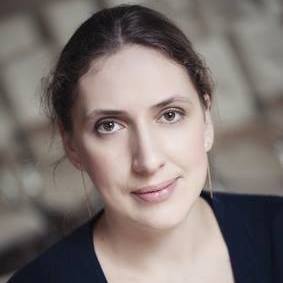 Ilona Sologub, Research Associate at the Kyiv School of Economics (Ukraine)
Ilona Sologub, Research Associate at the Kyiv School of Economics (Ukraine)
The President succeeded in changing the management of Ukrnafta, controlled by Privat, with a huge scandal (though, rumor has it that the new Chairman of the Executive Board of the company also receives salary from Kolomoisky). A law was adopted to lower the quorum for a meeting of shareholders of state enterprises (initiated by the Cabinet of Ministers of Ukraine), which allowed to get from Ukrnafta 1,8 billion of dividends over the last years. At the same time it is reported that the tax arrears of Ukrnafta grew in 2015.
It’s not quite clear what “the work of the coal industry has been established” really means; probably, it means cessation of the production decline. Although the government tried to abolish subsidies to the coal industry, it failed to do so in full: in 2015, subsidies amounted to UAH 900 million (ten times less than in 2013, mainly due to termination of subsidies to the coal mines on the occupied territory).
As for competitive appointment of managers of state enterprises, it was introduced back in 2008 under the decree №777 by the Cabinet of Ministers of Ukraine. In 2015, this decision was amended seven times. In particular, a special procedure for appointment of managers of the Ukrainian Defense Industry (Ukroboronprom) was introduced. Additionally, compulsory competitive procedure for selecting heads of state enterprises was introduced. In July, commissions for selecting heads of state enterprises were established. However, to our knowledge, no competition according to the new procedure was carried out (it is worth noting that there is great resistance to change of the management of state enterprises, for example, of Ukrposhta or Boryspil) [1].
The fight against corruption. The new parliament started its work more than a year ago, the President — one year and a half. Anti-corruption bodies are being formed very slowly, and their creation is accompanied by scandals, although they could have been established back in early 2015. Transparent public procurement is not only a state but also a largely public initiative. Automatic VAT refund hasn’t been implemented yet. There’s even evidence of return to the practice of “kickbacks” in VAT refund.
The President didn’t respond directly to the question about Shokin. It’s not just the General Prosecutor, “with whom Ukrainian people are unhappy”. Major international partners of Ukraine, who consider him a corruptionist, clearly expressed their thoughts regarding this question. And, judging by the investigation carried out by the “Schemes” program, both Poroshenko and Kononenko have their sins of the past, which are not currently investigated into, and, obviously, won’t be investigated while Shokin is in the halls of power. By the way, by mentioning the bill on the lifting of parliamentary immunity, submitted to Verkhovna Rada (№1776), the President once again avoided answering the question about Shokin and his other “friends”, because it is possible to remove a deputy’s immunity according to the current legislation — upon request of the General Prosecutor.
As for the deprivation of the right of general supervision, Deputy General Prosecutor Vitaly Kasko argues this is not the case. In addition, the law “On the State Bureau of Investigation” (which hasn’t yet entered into force), states the General Prosecutor’s Office supervises compliance with laws while carrying out functions of the Bureau (Article 29), so that the Bureau won’t be a completely independent body, though investigation of corrupt activities of the Office’s officials falls under its competence.
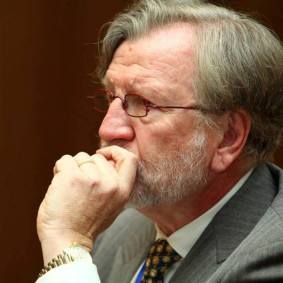 Gérard Roland, Professor of Economics and Political Science at the University of California, Berkeley, member of the Advisory Board at VoxUkraine (Ukraine)
Gérard Roland, Professor of Economics and Political Science at the University of California, Berkeley, member of the Advisory Board at VoxUkraine (Ukraine)
On the one hand, the President actively opposes decentralization reform fearing to lose control over local political processes [2], on the other hand, he argues that he shouldn’t be involved in the judges appointment process, especially in fighting corruption and in removal of Shokin. This is an apparent inconsistency.
As for Roshen, Poroshenko is cunning. Even if he’s not directly involved in the management of assets, no one can guarantee that his private interests won’t come into conflict with the state’s interests. He should have sold the company. In the West, it would be the right decision.
.
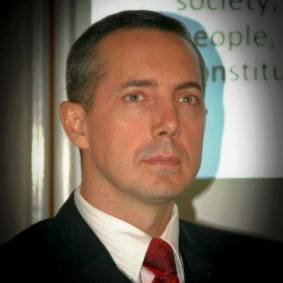 Mykhailo Minakov, D. Habil., President of the Foundation for Good Politics, CEO Eastern European Analytical Group (Ukraine)
Mykhailo Minakov, D. Habil., President of the Foundation for Good Politics, CEO Eastern European Analytical Group (Ukraine)
When the President talks about the General Prosecutor and deoligarchization, he mostly uses the pronoun “we” (which is something national, collective). He doesn’t give any clear answers. He is evasive on his personnel policy, referring to the non-existent “institutional” framework.
Total responsibility of the President for Crimea and to a lesser extent for Donbas and relations with Russia
Talking points of the President:
- Poroshenko met with members of the trilateral contact group (the question was about Boris Gryzlov, but the President didn’t mention his name while answering it — VoxUkraine). Ukraine requires clearly defined dates and what and when is done within the framework of the Minsk Agreements. The key point of the country’s security is to regain control of the uncontrolled part of the state border of Ukraine. Elections in Donbas should take part according to Ukrainian law, with participation of Ukrainian political parties, under supervision of Ukrainian mass media etc.
- There’s no energy blockade of Crimea. But Ukraine is ready to sign a contract with Russia for the electricity supply if the document will state “Crimea, Ukraine”.
“We are working with contracts, which state that Crimea is Ukraine”, — said the President.
- The peace plan (concerning Donbas — VoxUkraine) was supported by the UN General Assembly, the European Union, and the G-7 countries. Therefore, the return of Ukrainian sovereignty in Donbas is possible already in 2016. The President hasn’t made any specific predictions concerning Crimea.
- Russia’s economic problems are caused by sanctions, in which Ukraine (and specifically Poroshenko) played a key role.
- If Russia violates the Minsk Agreements once again, it will fall under new sanctions, which in consequence will lead to reduction of its military budget.
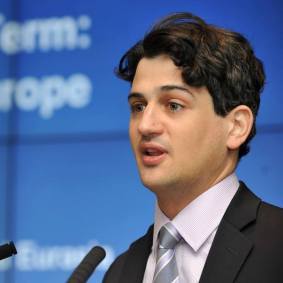 Samuel Sharap, Senior Fellow for Russia and Eurasia at the International Institute for Strategic Studies (United Kingdom)
Samuel Sharap, Senior Fellow for Russia and Eurasia at the International Institute for Strategic Studies (United Kingdom)
On Crimea energy blockade Poroshenko speaks directly, takes responsibility for this issue and makes clear that he’s the decision maker. Perhaps he’s even taking too much upon himself, because officially the Ministry of Energy and Coal Industry is not subordinate to him. He also says that electricity won’t be supplied to Crimea until the contract is signed on Ukrainian terms (Ukraine insists on calling Crimea Ukrainian, and not Russian in the contract — VoxUkraine). On the other hand, he says that there’s no blockade as such.
Technically both statements are correct. Ukraine shouldn’t sign the agreement, which contradicts its position on Crimea. However, this situation isn’t that simple as portrayed by the President. Nobody cancelled creative approach to diplomacy, and it’s quite possible to find an acceptable wording for both sides if there’s a political will. For example, the Inguri hydroelectric power station (which is included into the Georgian-Abkhazian conflict zone — VoxUkraine) is managed by two countries.
As for Donbas, Poroshenko says that we can expect progress already in 2016, but when it comes to Crimea, he makes it clear that he’s not going to create unrealistic expectations in the short term (and therefore makes no promises — VoxUkraine).
The President also clearly assumes responsibility for Ukraine’s role in the Minsk process. He casually suggests that “the continuation of the same hybrid relations” with Russia is the most likely scenario.
As far as Minsk II is concerned, he’s telling the truth. However, he avoids important details, particularly on the political settlement of the Donbas question. He mentions borders and elections, but says nothing about the constitutional reform, local autonomy of Donbas and amnesty, according to the Minsk II agreement. Also, he avoids a direct answer to the question of the seriousness of Russian intentions in the East of Ukraine. For him, to say “if Russia initiates an attack, the West will impose new sanctions” is to deny his own responsibility for the consequences of such a scenario (loss of Ukrainian military and new economic difficulties for Ukraine), as well as the need for a counter attack (but it can’t be said that the President doesn’t make any efforts, including unpopular, to prevent escalation of the conflict — VoxUkraine). His words suggest that the EU and the US, not Ukraine, will respond to Russia in the event of a further escalation of the conflict.
As for Western sanctions against Russia, the President made it clear: his personal involvement is crucial in the EU decision making process. He also said he wasn’t going to bargain with Russia on this subject. However, he said that Russia’s economic problems are a direct consequence of the Western sanctions. It is not the case, since falling oil prices (due to slowing of global economic growth and development of alternative methods of production — VoxUkraine) is a much more important factor. In addition, Russia’s budget problems have no effect whatsoever on its ability to continue mass destruction in Eastern Ukraine.
 Mykhailo Minakov, D. Habil., President of the Foundation for Good Politics, CEO Eastern European Analitical Group (Ukraine)
Mykhailo Minakov, D. Habil., President of the Foundation for Good Politics, CEO Eastern European Analitical Group (Ukraine)
Replying to a question about the war, the President often uses “I” rather than “we”. This is somewhat evasive, but we can say that the President partly takes responsibility for resolving the conflict. He is extremely vague when speaking of Crimea and Crimean Tatar / Right Sector initiative of the blockade. He is very evasive in his answers. He has no leader position whatsoever — both in words and in decisions.
.Economy and reforms are the strong side of the President
Summary of the answers:
- The debt owed to Russia can’t be restructured bypassing agreements with other creditors of Ukraine.
- Problems in the banking system have been accumulating since the 2008 crisis, and much of the credit goes to Valeriya Gontareva, the Chairwoman of the National Bank of Ukraine, who addressed this issue. That’s what the President approves.
- The inflation is caused by the current slowdown of the global economy and the reduction in commodity prices (which should slow inflation, but also weaken the hryvnia because of a significant share of raw materials in Ukrainian exports — VoxUkraine).
- The President doesn’t appoint and doesn’t dismiss the government, that’s the job of the coalition (in response to a request to evaluate the work of the Cabinet of Ministers — VoxUkraine). He is interested in a professional and responsible approach to formation of the government.
- Poroshenko promised to contact the police regarding abuses during the construction of the Ohmatdyt clinic. He also thinks that the healthcare reform lies in reviewing the “medical institutions — patient” relations.
“Healthcare is neither a bed nor equipment; it’s a change of the relationship between the patient and the doctor. The radically new system of health insurance is a system of protection of the indigent through the mechanism of insurance subsidies. If you don’t provide services, you don’t get the money, but if you provide quality service, the state and the insurance system will help you further develop”, — the President pointed out.
- The President promised that within the next few days he would submit to Verkhovna Rada bills necessary for the adoption of the EU visa-free regime with Ukraine. He was sure that the parliament would vote for these initiatives in early February.
- Adoption of the budget and amendments to the Tax Code brought Ukraine significantly closer to obtaining the IMF tranche. Poroshenko plans to meet soon with representatives of the IMF in Switzerland to finalize some very sensitive moments of the Memorandum. His participation in this process is indispensable.
- Agricultural, IT, nuclear, hydropower, as well as military and industrial sectors are top priority industries for Ukraine. There’s also a need for investments into energy efficiency.
 Ilona Sologub, Research Associate at the Kyiv School of Economics (Ukraine)
Ilona Sologub, Research Associate at the Kyiv School of Economics (Ukraine)
In the economic part of his speech Poroshenko didn’t make any mistakes and didn’t distort facts. He demonstrated that he’s equally good both in the state debt issue and the issue of the banking system problems. He mostly gave direct and relevant answers.
Inflation and the state of economy
The President openly supported the National Bank and its head Valeriya Gontareva whom he appointed to this post, praising the state manager on air. At the same time he refrained from assessing performance of the government and shifted responsibility for its work on the coalition. Technically he’s right, but some ministers were appointed by the President’s “quota”. In addition, he controls the largest parliament faction, and therefore has a greater influence on the government than he would like to show.
As the President said, the banking system required improvement, and its problems began after the 2008 crisis due to: excessive lending, including lending in foreign currency of individuals who didn’t have earnings in foreign currency; related party lending; participation of banks in dubious schemes, including money laundering.
In all likelihood, in 2016 improvement of the banking system will continue, albeit at a slower pace. As for Valeriya Gontareva’s nomination to the position of the world’s best banker (as Poroshenko reported during the press conference — VoxUkraine), we couldn’t find such information in open sources. The National Bank of Ukraine fenced with the question:
“We don’t exclude that the Head of NBU may be nominated by the international community for the said nomination in one of the ratings”.
It is obvious that when explaining the high rate of inflation for the previous year (43.3% — VoxUkraine), the President was trying to build a logical chain: plunging of commodity prices (the main component of Ukrainian exports) -> devaluation of the hryvnia -> growth of prices in hryvnia for imported goods -> increase in the general price level (inflation).
Indeed, commodity prices (commodities) are falling all around the world — starting with oil and ending with sugar. For example, the price of 1 ton of wheat per year (4th quarter of 2015 compared to 4th quarter of 2014) decreased by almost a third, the price of iron ore — by 36.5% (World Bank data), and proceeds to Ukraine from metals exports for 10 months of 2015 were lower than in the same period of 2014 (by almost 40%). Revenues from grain exports for the same period decreased by 10% (data from the State Statistics Service), which was due to a decline both in prices and physical volume of exports.
However, it is necessary to remember that Ukrainian import prices also fell. The volume of oil imports in cash for the period of 10 months in 2015 accounted for only 36% of the volume in the same period of 2014. And gas imports (in money equivalent) declined by almost 15%. March and April 2015 saw the largest price increases, and after that inflation began to gradually slow down. The reasons for the rise in prices in the spring of 2015 were:
- Panic on the currency market in February, caused in particular by the high demand for the currency from Naftogaz and escalation of the military conflict, as well as significant devaluation of the hryvnia, which was brought down by introducing restrictions on the movement of capital. Let us note that without retention rate before the parliamentary elections devaluation might have been lower.
- Weakening of the hryvnia caused faster growth in import prices and spreading of the consumer market panic (although this panic calmed down quickly).
- Dramatic increase in public utility rates for the population.
- A significant level of monopolization of the economy, which prevents lowering of the prices.
In a word, the President suggests considering the global trends, independent of the Ukrainian authorities, to be the main causes of inflation. However, in our opinion, the internal factors listed above, which the President didn’t mention, are also important in the inflation process.
Debt to Russia
Commenting on the state debt, the President didn’t take the responsibility, because this is the area of responsibility of the Ministry of Finance. However, Poroshenko responded directly to the question about Ukrainian position on the Russian debt from Yanukovych times, which can’t differ from the position towards other creditors, especially since the Minister of Finance Natalie Jaresko more than once stated her readiness to negotiate.
Healthcare
When asked about the reform of the healthcare system, the President told the audience about the main principles of the reform (bill 2309a), in particular, “the money follows the patient” and “medical institutions receive money for the provided services”. He promised to address the law enforcement bodies to investigate abuses of the previous authorities while building the Okhmatdyt clinic, thus answering the journalist’s question.
Visa-free regime
The President somewhat exaggerated Ukrainian achievements in the implementation of the EU requirements necessary for the visa-free regime. According to Poroshenko, the European Commission clearly determined that Ukraine had fulfilled all the obligations, and the European Commission was going to offer the European Parliament and the Council of Europe to provide Ukraine with a long-awaited visa-free regime.
However, the European Commission report on Ukraine’s compliance with the visa-free criteria, to which the President seemed to refer, was in many aspects an advance to our country. In particular, during the first quarter of 2016 Ukraine should:
- Launch the National Anti Corruption Bureau and the Specialized Anti-Corruption Prosecutor’s Office (in particular, it is necessary to adopt legislative changes on the process of appointment and dismissal of the anti-corruption prosecutor, which would guarantee their independence).
- Launch the Agency for Prevention of Corruption and immediately start checking the assets and potential conflicts of interest of the officials (in particular, it involves amending the law on the state budget to launch electronic declaration in 2017).
- Launch the Agency for Return of Assets, which includes adopting legislation on special confiscation.
- Ensure budget funding of the mentioned organizations.
The President took the responsibility to introduce to the parliament the bills necessary to further advance the process of adoption of the visa-free regime (see Paragraphs 1-3 above). To this time, there were no reports on the state budget amendments from the President. It is also unclear how he is going to ensure a positive outcome of the vote in Verkhovna Rada.
Economic strategy of Ukraine
Talking about the strategy of Ukraine, Poroshenko mentioned the need to open markets, to implement the association with the EU,
“to lift the paper curtain of visas, … because 77% of Ukrainian foreign investments are investments from the EU”.
Everything is right, except that in these 77% of investments there’s a significant proportion of investments from Cyprus (36%), which are mostly funds previously sent offshore by Ukrainians.
Poroshenko mentioned agricultural, IT, nuclear, hydropower, as well as military and industrial sectors among top priority industries for Ukraine. Perhaps these industries have really good prospects in the current Ukraine. But the President didn’t say what the “priority” of these sectors means. We hope that he didn’t mean government support of these industries.
Instead of an epilogue
In general, the President tried to show how significant had been the progress of Ukraine in 2015. And we must say that in many ways he was right. However, when it comes to the most important issue — the fight against corruption, a key problem of the Ukrainian state, — progress is quite modest. And it was possible in spite of, rather than thanks to the efforts of the senior officials. And, unfortunately, while answering the questions about corruption the President mostly avoided direct answers.
Notes
Attention
The authors do not work for, consult to, own shares in or receive funding from any company or organization that would benefit from this article, and have no relevant affiliations
